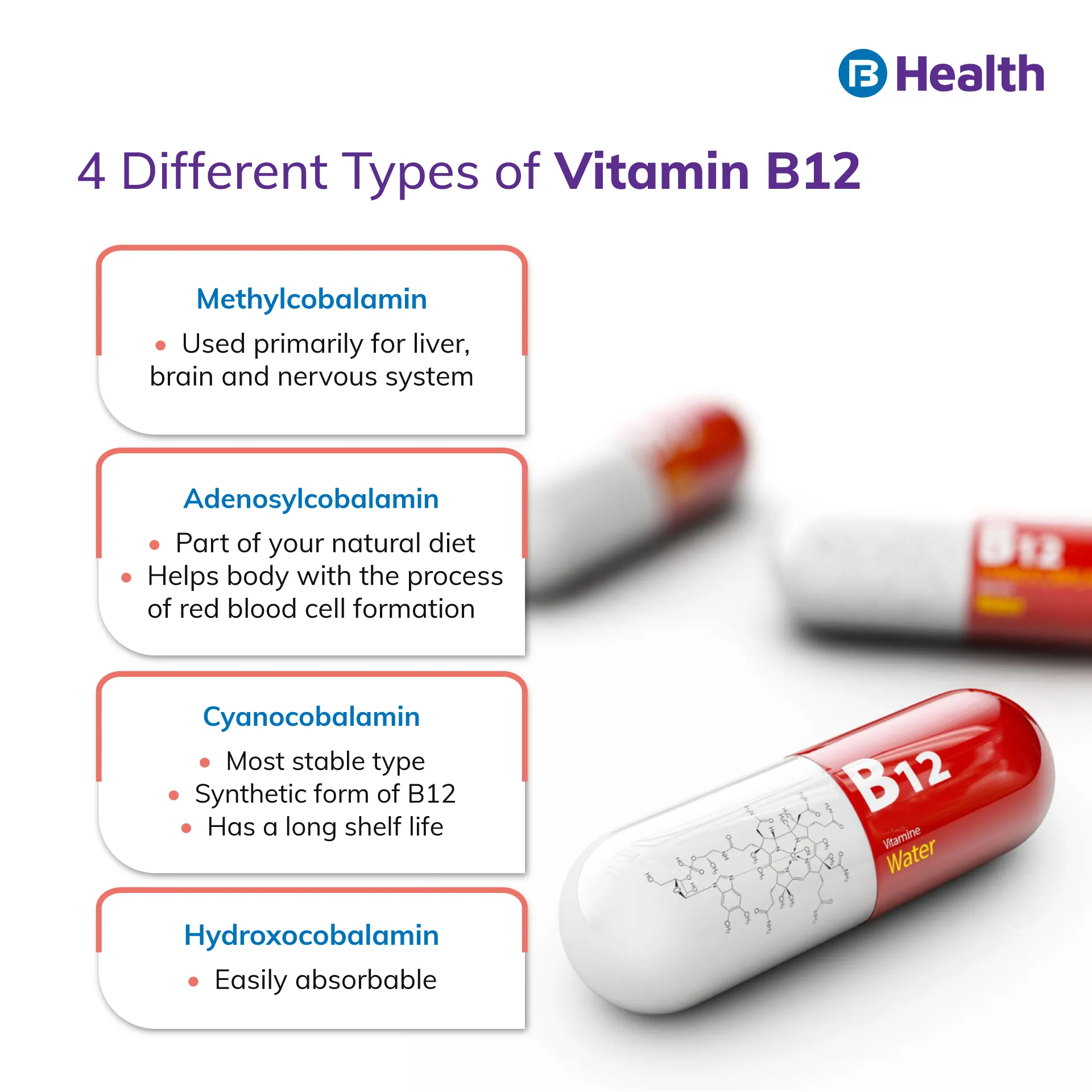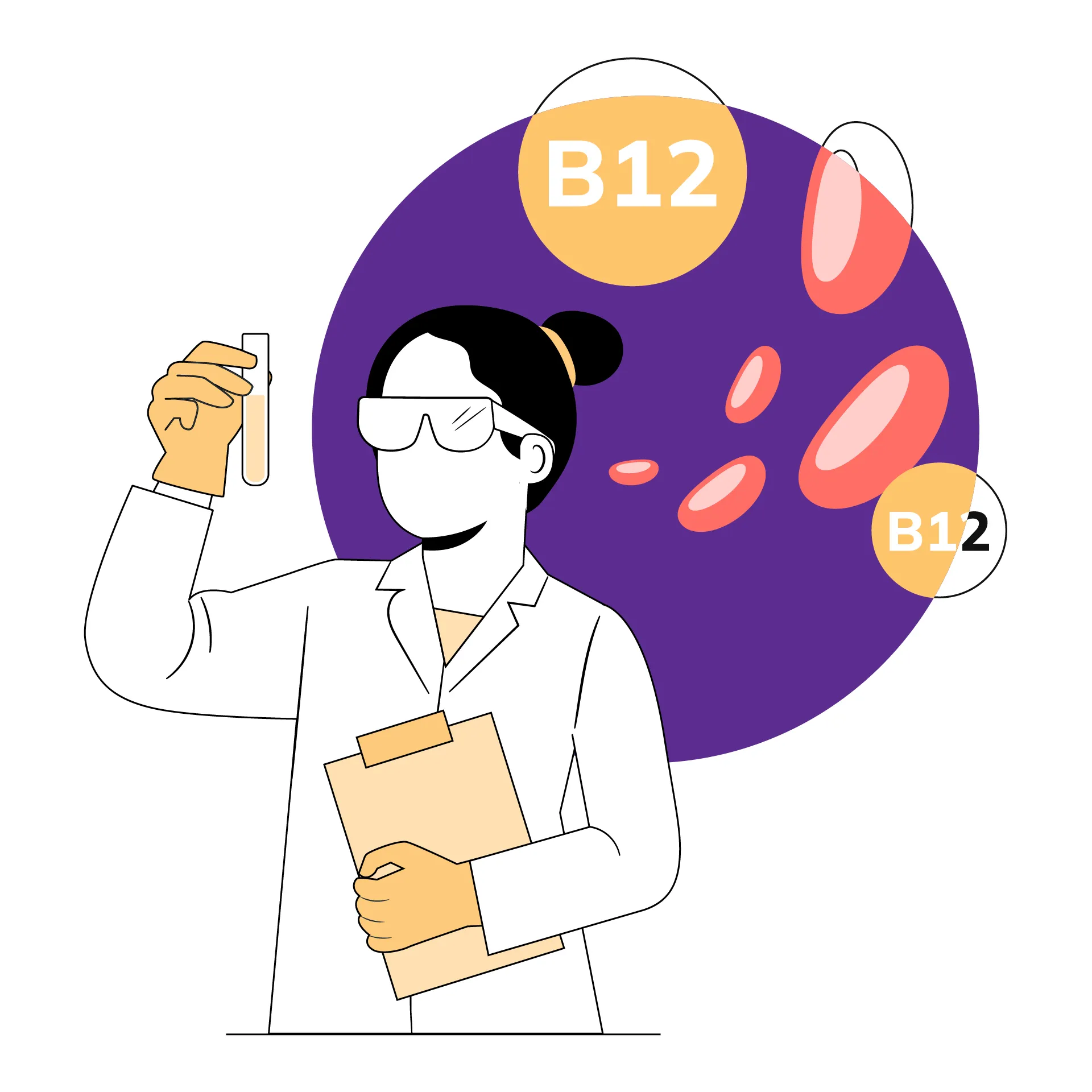Psychiatrist | 6 min read
Methylcobalamin: Uses, Benefits, Precautions, Side Effects, Dosage
Medically reviewed by
Table of Content
Key Takeaways
- Methylcobalamin is an important vitamin B12 supplement
- Vitamin B12 tablets help your brain and nerves to function
- There are different methylcobalamin tablets uses for skin and hair
Your body needs a wide range of nutrients to perform basic functions. Among these, vitamin B12 plays a vital role in red cell production, nerves, and brain health. The deficiency of this vitamin in your body can result in fatigue, headaches, and depression, which can affect your day-to-day life. There are many sources through which you can ensure that you do not have a deficiency. This includes methylcobalamin tablets, diet, and other vitamin B12 supplements. Tablets of methylcobalamin are mainly used to treat vitamin B12 deficiency. It can also help treat other conditions such as pernicious anemia, lateral sclerosis, diabetes, peripheral neuropathy, and more.
What is Methylcobalamin?
It helps treat vitamin B12 deficiency. This vitamin plays a vital role in the production of red blood cells and the synthesis of DNA. The two sources of vitamin B12 are methylcobalamin and cyanocobalamin. While cyanocobalamin is a synthetic preparation of vitamin B12, methylcobalamin is a natural form of vitamin B12. You can obtain methylcobalamin from supplements or foods like milk, eggs, and fish. There are numerous methylcobalamin uses and benefits you must know.
Methylcobalamin Uses
1. Methylcobalamin Tablet Uses in the Brain
It helps your body create the myelin sheath [1]. The main function of this sheath is to help speed-up nerve impulses. It is also vital in maintaining your nerve function. Nerves act as a means to carry signals between your brain, spinal cord, and the rest of your body. Lack of methylcobalamin can damage the myelin sheath. This may lead to nerve damage that is irreparable. When your body gets a sufficient amount of vitamin B12 through methylcobalamin, it can keep your nerves healthy. Healthy nerves then help ensure that your brain functions smoothly.
Additional Read: Evion 400 Uses and Side effects2. Methylcobalamin Tablet Uses for Hair
As mentioned above, vitamin B12 boosts your red blood cell production. With oxygen carried from red blood cells, your body cells, including the ones on the scalp, can repair and grow. This then helps ensure that you have healthy hair growth. These cells are rich in oxygen and nourish your hair follicles. Methylcobalamin provides a boost of vitamin B12 if you are deficient and benefits your hair growth.
3. Methylcobalamin Uses for Skin
All of the 8 B vitamins are essential to keep your skin healthy. Among them, vitamin B12 can help because it can speed up the skin healing process, and therefore a vitamin B12 supplement is often recommended for acne, dryness, and inflammation. It helps in these conditions because it boosts your skin cell production. Given these benefits, a vitamin B12 supplement is also often recommended as a treatment for eczema and psoriasis.
Additional Read: Vitamins For Hair Growth
Methylcobalamin Benefits
The compounds present in this medicine help in neuronal protection by regenerating the damaged nerves. This enables neurons to function properly, thus helping in the treatment of conditions like [2]
- Peripheral neuropathy
- Dementia
- Alzheimer's
- Parkinson's
- Neuropathic pain
Methylcobalamin Side Effects
Though this vitamin B12 supplement has rare side effects, it is important to ensure that you are not allergic to it. If you experience any allergic reactions like swelling of the throat, tongue, face, or lip, you should visit a doctor or a hospital immediately. This can help you get timely treatment and avoid further complications.
Apart from an allergic reaction, you may experience the following side effects:
- Nausea or vomiting
- Headache
- Breathing problems
- Chest pain or tightness
- Diarrhea
- Skin rash
Precautions
For Using Methylcobalamin
It is important that you follow certain precautions while taking any medication. Consult your doctor and discuss your medical history. This is especially important if you have any of the following
- Deficiency of folic acid
- Hypokalemia
- Iron deficiency
- Leber's disease
- Optic nerve damage
Few other precautions you need to take include the following
- Inform your doctor if you are allergic to cobalt or vitamin B12.
- Avoid consuming it with alcohol.
- Let the doctor know if you are pregnant or breastfeeding.
- Mention if you have any liver or kidney impairment.
- Make sure to inform the doctor about other kinds of medications you will be taking with methylcobalamin.
Methods for Consuming Methylcobalamin
- The right dose of methylcobalamin tablets will be prescribed by your doctor, and it is generally consumed orally.
- In case you require a higher dose, you can opt for an injection. This methylcobalamin injection is generally administered a few times a week.
- Your doctor or nurse may also direct you on how to inject the drug via a syringe correctly so that you can do it on your own at home.
- Read and follow all directions properly.
- If you don't understand any particular instruction given to you, consult your doctor.
- Do not swallow or chew the methylcobalamin tablets. Allow them to dissolve in your mouth.
Things to Remember About The Dosage:
- Missing one or two doses of methylcobalamin will cause no problem, so do not start panicking
- In certain cases, doses may cause sudden chemical changes in your body
- Overdose of this medicine will leave harmful effects on your body
- Be extremely careful to not miss your doses or consume extra tablets as they can lead to medical emergencies
- The recommended dose is 500 mcg thrice a day
- You may also be prescribed methylcobalamin tablets 1500mcg as a single daily dose by your doctor
Methylcobalamin Side Effects
Now that you are aware of Methylcobalamin’s uses for hair and skin, along with the different benefits Methylcobalamin, it is vital for you to know about its side effects. While you should know about methylcobalamin tablet uses, it is equally necessary for you to study its side effects before taking it.
Here are a few methylcobalamin side effects.
- Diarrhea
- Vomiting
- Fatigue
- Anxiety
- Rashes on the skin
- Severe headache
- Nausea
- Poor appetite
While these are common side effects, remember that you may require immediate medical attention if you develop allergic reactions or breathing discomfort after taking the tablet.
Methylcobalamin Dosage
It is important for you to know about the dosage of methylcobalamin tablets. When your doctor informs you about methylcobalamin tablet uses and dosage, you must follow her or his advice strictly. If you have been prescribed methylcobalamin tablets, you can take them orally with water. If the tablet is in the form of lozenges, allow the tablet to dissolve in your mouth rather than chewing it.
In case of injections, you may have to visit the clinic at least once weekly to inject the medicine into your muscles. Make sure to follow the doctor’s prescription and follow the specified dosage. If you missed a dose, don’t worry. You may not have an adverse reaction but keep your doctor informed. Ask your doctor when you can continue taking the prescribed medicine. However, overdosage can result in harmful reactions that may require immediate medical intervention.
Though there are many methylcobalamin tablets used, be careful while taking them. Always keep your medicines away from the reach of children. Do not keep the medicines in direct contact with light, heat, or air, as this can damage them. Never share your medicines and use them as per the prescription. Find nearby doctors with ease on Bajaj Finserv Health to get proper guidance for all your medical issues. Book an in-clinic or online doctor appointment and get expert advice on all health-related concerns.
References
- https://www.ncbi.nlm.nih.gov/pmc/articles/PMC3674019/
- https://austinpublishinggroup.com/pharmacology-therapeutics/fulltext/ajpt-v3-id1076.php
Disclaimer
Please note that this article is solely meant for informational purposes and Bajaj Finserv Health Limited (“BFHL”) does not shoulder any responsibility of the views/advice/information expressed/given by the writer/reviewer/originator. This article should not be considered as a substitute for any medical advice, diagnosis or treatment. Always consult with your trusted physician/qualified healthcare professional to evaluate your medical condition. The above article has been reviewed by a qualified doctor and BFHL is not responsible for any damages for any information or services provided by any third party.








